MercoPress. South Atlantic News Agency
Economy
-
Wednesday, August 9th 2023 - 03:15 UTC
UK food prices are slowing; 'cautious optimism' from British Retail Consortium

New figures suggest food United Kingdom price inflation has slowed to its lowest level this year as prices of oils, fish, and breakfast cereals fall. According to the British Retail Consortium (BRC) and NielsenIQ retail analysts, food inflation slowed to 13.4% in July. It was 14.6% in June. But overall, shop prices are still 7.6% higher this July than a year ago.
-
Tuesday, August 8th 2023 - 15:18 UTC
Record export of Brazilian food commodities, but prices are falling

Brazilian primary goods exports could surpass last year's export record of US$ 159 billion, be it not for the sharp drop in commodity prices on the foreign market.
-
Tuesday, August 8th 2023 - 10:49 UTC
Argentina: “Blue” dollar closes in on AR$ 600 threshold
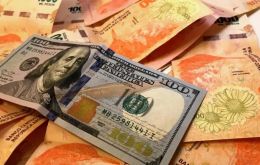
The “blue” (a euphemism for “black market”) dollar rose sharply on Monday and closed at AR$ 596, thus reaching a new all-time high ahead of next Sunday's Simultaneous, Mandatory, and Open Primary (PASO) elections, it was reported in Buenos Aires. The gap with the official quotation stood at 110.8%.
-
Tuesday, August 8th 2023 - 10:25 UTC
Brazil's Central Bank launches digital currency plan
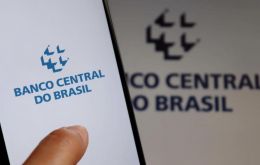
Brazil's Central Bank (BCB) Monday announced a new digital currency for South America''s largest country, which will be called “Drex” and is not expected to reach account holders before late 2024, Agencia Brasil reported.
-
Monday, August 7th 2023 - 10:16 UTC
Retail sales keep plunging in Argentina

Argentina's Confederation of Medium-Sized Companies (CAME) said in a report released Sunday that retail sales dropped 3.6% interannually in July for a total 1.6% reduction so far in 2023 as “inflation is hitting consumption in all areas of the economy except in the pharmaceutical sector.”
-
Saturday, August 5th 2023 - 10:50 UTC
Singapore interested in sealing trade accord with Mercosur and in the Port of Santos concession

The government of city-state Singapore, in Southeast Asia, intends to participate in the concession process for Brazil's largest terminal, the Port of Santos (SP), as part of the greater trade negotiation with the Mercosur block.
-
Saturday, August 5th 2023 - 10:34 UTC
Argentina: “Blue” dollar up again; trend expected to continue
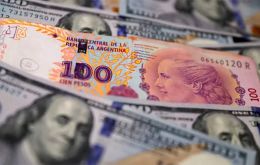
The “blue” exchange rate between the Argentine peso and the US dollar closed Friday at AR$ 574 while the Central Bank (BCRA) continued buying foreign currency to feed its dwindling reserves, it was reported in Buenos Aires.
-
Saturday, August 5th 2023 - 10:31 UTC
Argentina pays the IMF with loan from Qatar
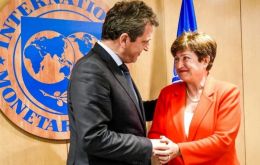
Argentine authorities Friday announced that they would be paying the International Monetary Fund (IMF) a maturity worth US$ 775 million through a 580 million Special Drawing Rights (SDRs) loan from Qatar. The Asian nation will lend Argentina Special Drawing Rights (SDR, money that countries reserve in the IMF), it was explained.
-
Friday, August 4th 2023 - 10:56 UTC
“Blue” dollar knows no ceiling in Argentina

The “blue” (a euphemism for “black market”) dollar went up again Thursday in Argentina hitting a new all-time high of AR$ 570 at the end of the day as the Aug. 13 Simultaneous, Mandatory, and Open Primary (PASO) presidential elections loom over, it was reported in Buenos Aires.
-
Friday, August 4th 2023 - 08:17 UTC
Bank of England rate up to 5,25%, highest in fifteen years; no prospects of abating
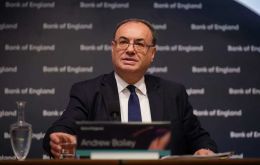
The Bank of England raised on Thursday its main interest rate to 5.25%, the highest in 15 years, as the country strives to control persistently high inflation. The quarter percentage point hike was the bank's 14th in a row.
